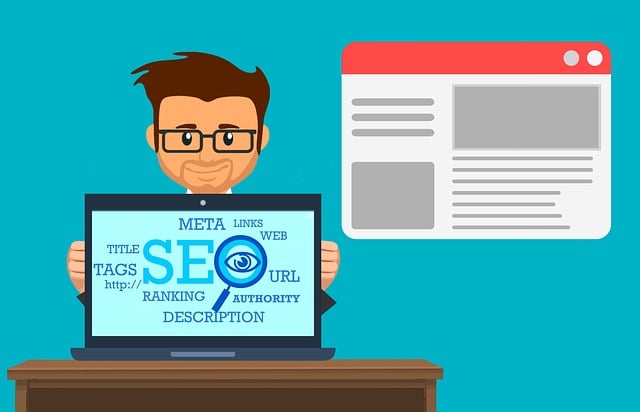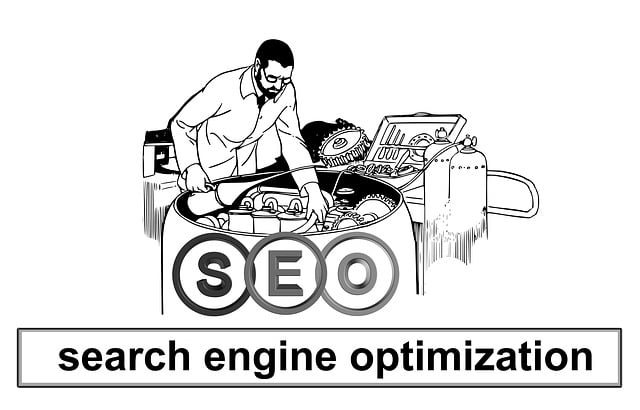On-Page SEO is crucial for online success, focusing on optimizing individual web pages to improve rankings and attract relevant traffic. This involves refining elements like title tags, meta descriptions, header tags, content quality, and keyword optimization for better search engine visibility. High-quality, engaging content with strategic keyword placement establishes authority and builds trust. Off-Page SEO, through building a robust backlink network from reputable sources, significantly boosts online presence and rankings. Earning quality backlinks through compelling content, guest blogging, and influencer collaborations is key. Social media integration enhances online visibility and user engagement, while Technical SEO ensures site structure, performance, and accessibility for improved search engine results. Regular measurement and analysis using tools like Google Analytics and Search Console are essential for data-driven optimizations in a competitive digital landscape.
In today’s digital landscape, a strong online presence is paramount for success. This article delves into the dual-pronged approach of SEO services, exploring both On-Page and Off-Page strategies crucial for maximizing visibility and rankings. From laying the foundation with On-Page SEO optimization to cultivating external authority through Off-Page tactics, each section provides insights into effective SEO services. Discover how high-quality content, strategic backlinks, social media engagement, and technical refinements contribute to a comprehensive SEO services strategy that drives results.
Understanding On-Page SEO: The Foundation of Your Strategy

Understanding On-Page SEO is crucial for any business looking to excel in search engine optimization (SEO) services. It forms the foundation upon which all other SEO strategies are built, ensuring your website resonates with both search engines and users. On-Page SEO involves optimizing individual web pages to rank higher and earn more relevant traffic from search engine results pages (SERPs). This includes refining elements like title tags, meta descriptions, header tags, content quality, and keyword optimization.
By focusing on these aspects, businesses can create a solid framework for their digital presence. Relevant, high-quality content that incorporates target keywords naturally is key. Additionally, ensuring proper formatting, easy navigation, and mobile responsiveness enhances user experience, which search engines favor. On-Page SEO is an ongoing process, requiring regular updates to stay aligned with search engine algorithms and keep your website at the forefront of competitive digital landscapes.
Key Elements of Effective On-Page Optimization

Effective on-page optimization is a cornerstone of any robust SEO services strategy. It involves optimizing individual web pages to rank higher and earn more relevant traffic in search engine results. Key elements include keyword research and strategic placement, high-quality content creation, and meta tag optimization. By incorporating keywords naturally into headings, subheadings, and body text, you signal to search engines what your page is about, enhancing its relevance for targeted queries.
Additionally, on-page SEO services focus on improving the user experience through structured data markup, internal linking, and fast loading times. These factors not only contribute to better rankings but also encourage visitors to engage with and share your content. Ultimately, a well-optimized on-page strategy forms the foundation for long-term success in attracting and retaining organic traffic.
Unlocking the Power of High-Quality Content Creation

In the realm of SEO Services, high-quality content creation is a game-changer that unlocks immense potential for online visibility and success. Well-crafted, relevant, and engaging content serves as the cornerstone of any effective SEO strategy. It not only attracts and retains users’ attention but also establishes authority and builds trust with search engines. When combined with strategic keyword integration, this compelling content signals to search algorithms that a website is valuable and worthy of a higher ranking.
The process involves a meticulous balance of research, creativity, and technical precision. Content creators, as professionals in this field, understand the nuances of crafting pieces that not only meet user expectations but also align with the latest search engine guidelines. By focusing on creating comprehensive, informative, and consistently updated content, businesses can effectively attract organic traffic, boost their online presence, and drive conversions, ultimately driving growth and success in a competitive digital landscape.
Off-Page SEO: Building External Authority and Backlinks

Off-Page SEO is a strategic approach focused on enhancing a website’s authority and visibility from external sources. It involves building a strong network of backlinks, which are essentially links from other reputable websites pointing to yours. This process is crucial for SEO services as it signals to search engines that your site is an authoritative source of information in your industry. High-quality backlinks from relevant, trusted sites can significantly boost your online presence and rankings.
Building external authority through Off-Page SEO requires a thoughtful strategy. It includes activities like guest blogging, where you contribute articles to popular blogs in your niche, securing mentions or links from these platforms. Engaging in social media interactions and influencer collaborations can also lead to organic backlinks as users share content that resonates with them. These external signals of trust and popularity contribute to the overall health of your website’s SEO, making it an indispensable component of any comprehensive SEO services strategy.
Strategies for Earning Quality Backlinks

Earning quality backlinks is a cornerstone of effective SEO services, playing a pivotal role in boosting your website’s authority and visibility. One powerful strategy involves creating compelling, share-worthy content that naturally attracts links from reputable sources. This could include in-depth guides, original research, or multimedia assets that address your target audience’s pain points and interests.
Additionally, leveraging guest blogging opportunities on established industry websites is a proven method to acquire high-quality backlinks. Building relationships with influencers and industry leaders can open doors to relevant platforms where you can contribute valuable content, thereby earning backlinks from authoritative sources while also expanding your reach within the industry.
Social Media's Role in Enhancing SEO Efforts

In today’s digital era, social media platforms have emerged as a powerful tool for enhancing SEO efforts. By integrating social media into your marketing strategy, you can significantly boost your online visibility and attract potential customers. When users share your content on social media, it increases your website’s exposure to a broader audience, which is crucial for improving search engine rankings. Moreover, social media platforms provide valuable insights into user preferences and behavior, enabling SEO service providers to tailor their strategies accordingly.
Social media also facilitates engagement with your target audience, fostering relationships that can lead to increased brand loyalty. Regular interactions on these platforms can drive more traffic to your website, as users are likely to share engaging content with their networks. This natural referral system strengthens your online presence and contributes to long-term success in SEO services, ensuring your website remains competitive in the ever-evolving digital landscape.
Technical SEO Considerations for Seamless User Experience

Technical SEO is an integral part of any comprehensive SEO strategy, focusing on optimizing your website’s structure and performance to enhance user experience and search engine visibility. It involves addressing various technical aspects that impact how search engines crawl and index your site. One of the primary goals is to ensure your website is accessible and functional across different devices and browsers, providing a seamless browsing experience for all users.
This includes optimizing site speed by reducing page load times, implementing structured data markup to help search engines understand your content better, creating an XML sitemap for easier crawling, and ensuring proper use of headers and meta tags. Additionally, mobile optimization is crucial, as most users now access websites via mobile devices. By considering these technical factors, you can significantly improve your website’s rankings in SEO services and create a robust online presence.
Measuring and Analyzing SEO Performance

Measuring and analyzing SEO performance is a crucial aspect of any digital marketing strategy. By employing tools like Google Analytics and Search Console, businesses can track key metrics such as organic traffic, keyword rankings, click-through rates, and bounce rates. These insights enable them to understand what’s working and what needs improvement in their on-page and off-page SEO services. Regular analysis allows for data-driven decisions that optimize content, refine strategies, and ultimately boost search engine visibility.
Effective performance measurement goes beyond mere numbers. It involves identifying trends, understanding user behavior, and converting data into actionable insights. For instance, a sudden drop in rankings could signal an algorithm update, prompting a reevaluation of SEO tactics. Conversely, increased organic traffic and lower bounce rates indicate successful optimization efforts that enhance user engagement. Thus, continuous monitoring is key to staying ahead in the competitive digital landscape.
